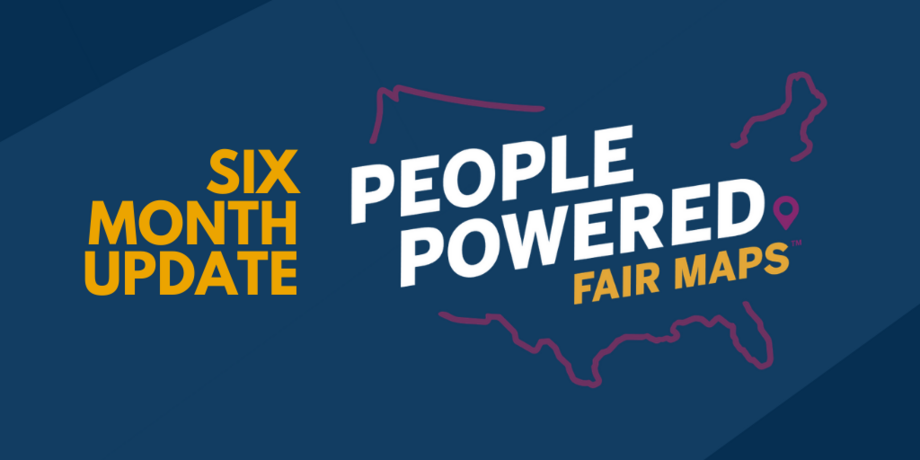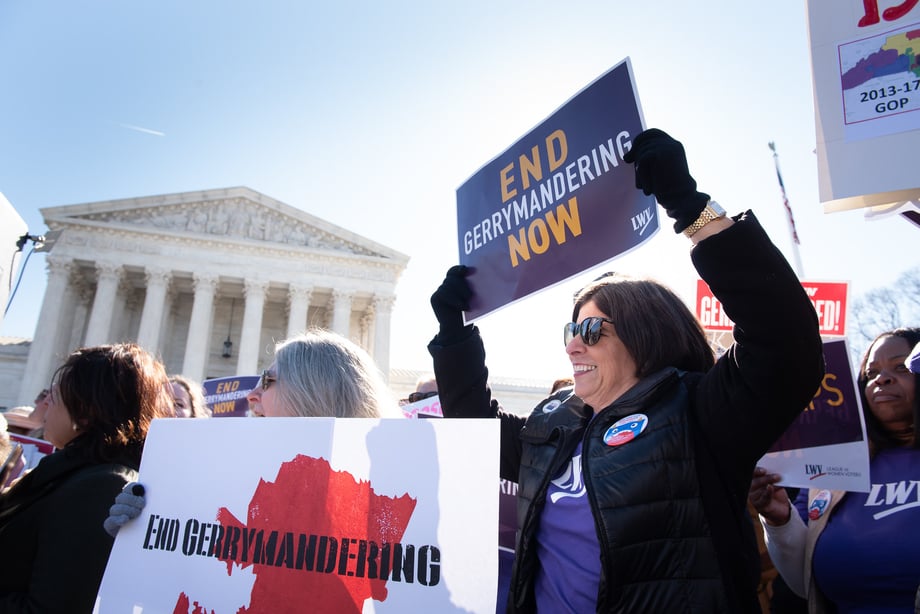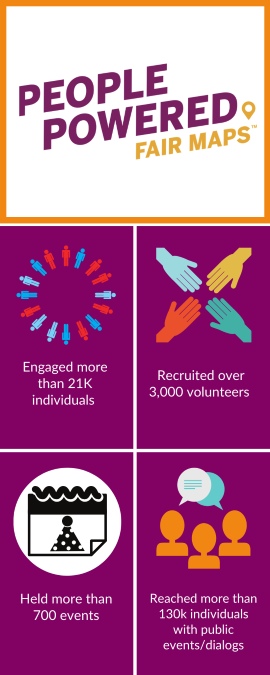Gerrymandering, or the practice of drawing district lines to protect the interest of political parties or politicians, undermines the redistricting process and suppresses the voice of voters. Politicians should not choose their voters—voters must be free to choose who they want to represent them. June 2020 will mark one year since the Supreme Court declined to set a standard to rein in partisan gerrymandering. This ruling played a major role in the launch of our campaign for People Powered Fair Maps™, six months ago.
Six months into People Powered Fair Maps


People Powered Fair Maps is a nationwide redistricting program that focuses on creating fair political maps in all 50 states and DC. The campaign is broken into five major focus areas:
-
Ballot Initiatives or Referendums
-
State Constitutional Options
-
State Legislative Fixes
-
Federal Legislative Fixes
-
Civic Engagement & Education
Ballot Initiatives or Referendums
In 21 states we are using the ballot initiatives or referendums process to protect fair redistricting in states where fair maps exist, to push for independent redistricting commissions, and to add fair redistricting provisions in states where there aren’t any. To date, we have had 13 ballot initiatives and referendums proposed. State Leagues in Arkansas, Nevada, North Dakota, Oklahoma, Oregon, and Virginia have made progress toward achieving this goal.
Updates from the States
October 2019
LWV of Oklahoma filed a ballot initiative to have an independent redistricting commission to manage the state’s redistricting process. They were the first League to kick off the ballot initiative efforts for the campaign but has been challenged several times. The most current challenge to their initiative questions the proper gist and constitutionality of the ballot initiative. They are currently waiting on a decision regarding this challenge.
November 2019
The LWV of Nevada filed a petition to create a nonpartisan committee to carryout legislative redistricting. Though challenged with opposition in Jackson v. Fair Maps Nevada, et al. , the League has re-filed the initiative amending the ballot langue and are official collecting signatures.
The LWV of Oregon proposed three ballot initiatives that will create a commission that Democrats, Republicans, and nonaffiliated members to oversee the redistricting process and prohibit major elected officials, lobbyists, party officials, and major political donors from being on the commission.
March 2019
The LWV of Arkansas with Arkansas Voters First began collecting signatures for a proposed amendment to have a commission draw legislative maps opposed to state legislators.
The coronavirus outbreak has added additional challenges to Leagues to collect signatures. States like Nevada, Oregon, and Arkansas have been seeking virtual options to continue collecting signatures. Arkansas Voters First and Campaign Legal Center with the LWV of Arkansas support has filed a lawsuit to ask the state to adjust the signature requirements for a ballot initiative due to current social distancing practices.
State Constitutional Options
Some state constitutions have a “free and fair” clause that protects the integrity of the elections process. We have been leveraging this clause to create fair map processes in states that don’t have them in place, as well as to protect the states with fair redistricting provisions. Pennsylvania, North Carolina, and New Mexico have successfully used the “free and fair” clause to ensure fair redistricting processes in their states.
State Legislative Fixes
The state legislative fix focus in our campaign involves two parts:
-
Seeking opportunities to improve public input in the redistricting process and coordinating with legislators to identify legislation that will set standard criteria
-
Pushing forward legislation that protects and increases transparency
Currently, state Leagues have held more than 1,200 meetings with state stakeholders. In November 2019 members of the LWV of Montgomery County in Indiana attended a rally at their state capitol urging the Indiana House and Senate to pass redistricting reform legislation. State and local Leagues in Illinois, Kentucky, and South Dakota all have publicly called on their state legislators to pass legislation that will create fair redistricting practices.
Federal Legislative Fixes
Federally, we are pushing for Congress to restore the Voting Rights Act of 1965 along with working to pass additional legislation to protect voters and the redistricting process from racial and partisan gerrymandering. This legislation is called the Voting Rights Advancement Act (VRAA). December 2019 the U.S. House of Representatives passed the VRRA. The bill is now waiting to be voted on by theSenate.
Civic Engagement and Education
 Civic engagement and education is one of the most critical pieces of our campaign. People Powered Fair Maps is nothing without “People”— getting people involved with the process and sharing their stories of how gerrymandering has impacted their lives. Our Leagues are connecting with communities and empowering them to speak on the need for fair maps. Leagues have hosted events, wrote letters to the editor/op-ed, and used social media to inform and engage community members about the need for fair maps.
Civic engagement and education is one of the most critical pieces of our campaign. People Powered Fair Maps is nothing without “People”— getting people involved with the process and sharing their stories of how gerrymandering has impacted their lives. Our Leagues are connecting with communities and empowering them to speak on the need for fair maps. Leagues have hosted events, wrote letters to the editor/op-ed, and used social media to inform and engage community members about the need for fair maps.
This work has not been done alone! Our Leagues have partnered with many organizations in their states, forming coalitions to push the importance of fair maps. Some of the most common partners have been state chapters of the ACLU and NAACP, as well as Sierra Club, the Brennan Center for Justice, and Common Cause.
There are many ways that people can participate in the People Powered Fair Maps campaign. The most immediate way to get involved is by completing the 2020 Census.
The census count has a direct impact on the redistricting process. Numbers from the count are used to determine how many individuals belong to each district and ultimately how district lines are drawn. To be counted in the census visit 2020Census.gov.
As we prepare for redistricting in 2021, our work to fight for and protect People Powered Fair Maps is more important than ever. We encourage everyone to find ways to support fair maps in their communities. Find your local League today.
Sign Up For Email
Keep up with the League. Receive emails to your inbox!
Donate to support our work
to empower voters and defend democracy.





